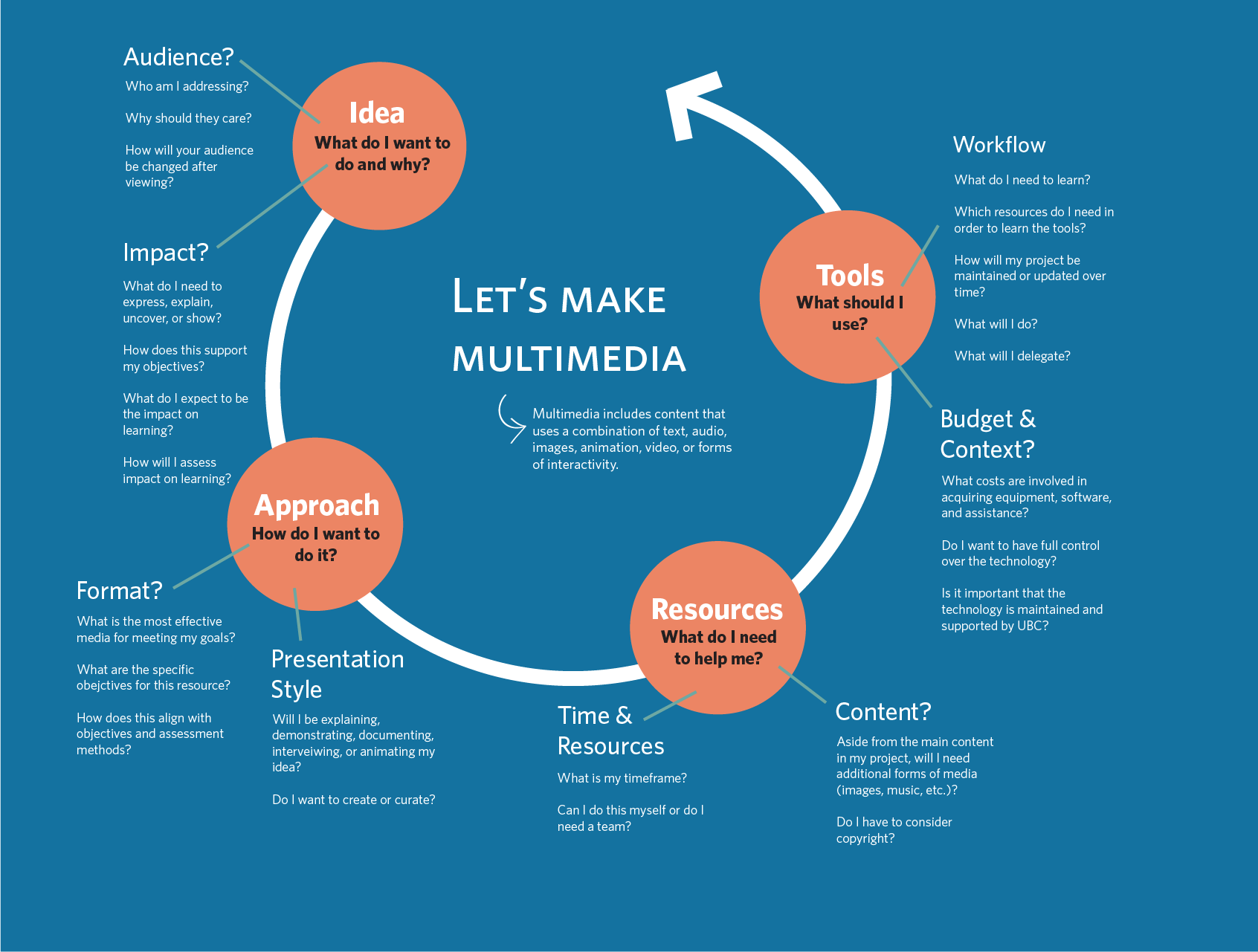8.2 Plan It!
Planning Multimedia
Review the infographic below as you think about how you will plan your project. Review the steps identified in the infographic to serve as a guide for planning.

Idea
The following questions can help you refine your idea:
- What is my objective?
- What do I want to express, explain, uncover, show or document?
- Why is it important?
- How will this resource be used?
Approach
The following questions can help you refine your approach:
- Does a similar resource to the one I am envisioning already exist online somewhere? You may want to check Creative Commons licensed sources as well as resources in the Public Domain to start.
- Can you curate content by building some activities or context around a video that already exists or do you need to create something new?
- What is my timeframe?
- Can I do this by myself or will I need a team?
- What approach will best help me meet my goals? To get a sense of what approach might serve your needs, review this table:
| Goal | Ingredients | Approach |
|---|---|---|
| Expose common misconception | Demonstrate a concept, interview students/others for predictions | Video |
| Demonstrate a process | Whiteboard or application on-screen to show actions | Screencast |
| Document experience | Go to a location if it is field experience you want to document, or conduct an individual interview if it is a personal story you want to document | Video interview |
| Set tone for the course/learning community | You and your TAs can use a web-cam to make a welcome or introductory video message | Web cam style video recording |
| Tell a story | Audio, video, images or some combination | Podcast, screencast, narrated slides, or video |
| Explain a complex concept or phenomenon | Expose details that are impossible to see, or highlight connections | animation, stop motion animation, screencast |
Questions to consider:
- What do I need to know about copyright? (if you are producing resources and publishing online)?
- Plan Your Project Worksheets: Video [PDF], Audio [PDF], Screencast [PDF]: Guides to help you work out the learning objectives, content and associated learning activities.
Further questions to consider:
- Am I intending to publish to content? If so, how will I handle permissions?
- What will I need to budget for?
- Will I need to purchase equipment or can I borrow it?
- Can I do what I want to do with the equipment I have?
- What sort of permission(s) will I need to obtain (ie student permissions)?
Tools
The following questions can help you choose your tools:
- Will I incur any costs related to the use or maintenance of the tool I select?
- How much of an investment will I need to make to learn the tool or approach I have selected?
- Is there a return on investment of my time in learning this tool?
- Will I need to update the project ongoing? Will the tool or service I choose support that?
- Have I tested it? (ie. the file formats it exports to, transferability of those files, etc.)
- What training and skills are required?
- What are the benefits to collaborating on, hosting or embedding my work in an open environment (ie YouTube, Blogs, Wiki, Wikipedia, etc)? What are the risks?
Planning Worksheets: to help you work out your goals, and associated learning activities. Disclaimer: These worksheets are geared for educators however, the steps related to planning a multimedia project are both helpful and valid.
- Plan Your Screencast Project Worksheet [PDF]
- Plan Your Video Project Worksheet [PDF]
- Plan Your Audio Project Worksheet [PDF]
Checklists
- Audio planning checklist [PDF]
- Video planning checklist [PDF]
- Screencasting planning checklist [PDF]
Image description
Figure 8.2a Image Description:
Let’s make multimedia. Multimedia includes content that uses a combination of text, audio, images, animation, video, or forms of interactivity.
Idea: What do I want to do and why?
Audience?
-
- Who am I addressing?
- Why should they care?
- How will your audience be changed after viewing?
Impact?
-
- What do I need to express, explain, uncover, or show?
- How does this support my objectives?
- What do I expect to be the impact on learning?
Approach: How do I want to do it?
Format?
-
- What is the most effective media for meeting my goals?
- What are the specific objectives for this resource?
- How does this align with objectives and assessment methods?
Presentation style
-
- Will I be explaining, demonstrating, documenting, interviewing, or animating my idea?
- Do I want to create or curate?
Resources: What do I need to help me?
Time & resources:
-
- What is my timeframe?
- Can I do this myself or do I need a team?
Content?
-
- Aside from the main content in my project, will I need additional forms of media (images, music, etc.)?
- Do I have to consider copyright?
Tools: What should I use?
Workflow:
-
- What do I need to learn?
- Which resources do I need in order to learn the tools?
- How will my project be maintained or updated over time?
- What will I do?
- What will I delegate?
Budget & Context?
-
- What costs are involved in acquiring equipment, software and assistance?
- Do I want to have full control over the technology?
- Is it important that the technology is maintained and supported by UBC (or another institution)? [Back to Fig 8.2a]
Attribution & References
Except where otherwise noted, this page is adapted from Plan It! In DIY Media by The University of British Columbia, CC BY-SA 4.0
- Original source: https://wiki.ubc.ca/Sandbox:Plan_It

